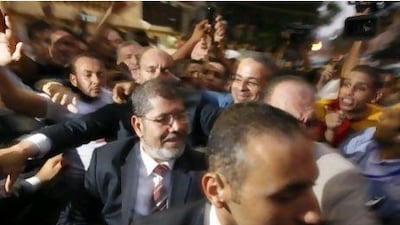CAIRO // Hours after voting finished in Egypt's presidential elections, both candidates yesterday declared they had decisively won the race.
But whoever the election commission formally announces as the winner on Thursday will assume a weakened office after military rulers issued an 11th-hour constitutional declaration eliminating many of the president's powers.
Critics said the move amounted to the completion of a "soft coup" by the Supreme Council of the Armed Forces (Scaf) 16 months after it took over the government from Hosni Mubarak.
At a 4am press conference yesterday, the Muslim Brotherhood's Mohammed Morsi said during a victory speech that he would be "a president for all Egyptians … a servant to them", and promised a "civil, democratic, constitutional and modern state". The group said he had won based on their tabulation of results from nearly every polling station, which were announced individually overnight.
There was confusion seven hours later when the campaign of Ahmed Shafiq, Hosni Mubarak's last prime minister, said he was beating Mr Morsi "beyond all doubt" with between 51 and 52 per cent of the votes.
Tallies by newspapers and other groups appeared to confirm Mr Morsi's claim that he had won.
The Supreme Presidential Election Commission has said it will not make an announcement until after it has had time to hear appeals and investigate claims of voting manipulation.
What is clear is that the eventual winner will assume only a fraction of the powers that Egypt's old 1971 constitution afforded the executive branch. Scaf's new constitutional declaration preventes the president from having any control of the military's budget or personnel and gives Scaf sole authority over the committee that will rewrite the new constitution. It does allow for the president to veto legislation and appoint the cabinet.
The document enlarged Scaf's already widening powers. The group of generals had already assumed legislative powers after the Supreme Constitutional Court ruled on Thursday that a portion of parliamentary elections were illegal and that the People's Assembly should be dissolved.
Mohamed ElBaradei, the Nobel laureate who was a contender for the presidency before bowing out in January, described Scaf's declaration as a "grave setback for democracy and revolution" on his Twitter page yesterday.
Two important events taking place today could significantly affect the country's transition. Members of the now dissolved parliament are planning to march and demand access to the building, despite Scaf's refusal to allow them to return to their offices and the parliamentary hall.
The political arm of the Muslim Brotherhood said yesterday that despite the military's decision to dissolve the assembly, the parliament still has the power to legislate, "The parliament remains valid and holds legislative power and control," the Freedom and Justice Party said in a statement.
More ominous for the Brotherhood is an expected hearing today from an administrative court about whether the Muslim Brotherhood is allowed to exist as a group. The case centres on the fact that the group, which was outlawed for nearly eight decades by the government, had not obtained a licence to operate as a non-government organisation. The plaintiff is a lawyer, Shehata Mohamed Shehata, who is demanding that the group's activities be frozen until it obtains the necessary licence.
The prospect of another blow to the Muslim Brotherhood proved that there were still serious obstacles to the group's rise to political power, said Walter Armbrust, a professor from the University of Oxford based in Cairo.
"There are several different ways that the military council could still pull the rug from under the Muslim Brotherhood," he said. "But they would be desperate measures. The question is how serious the generals believe the threat of the Muslim Brotherhood is to their power and Egypt."
Further court rulings and abrupt Scaf decisions raised the probability of "serious violence", he said. "I think we are getting closer and closer to some kind of endgame that will force the different sides to use force to protect their agendas."
Revolutionary groups and liberal political movements that failed to win broad support in elections over the past year were still reeling from the rapidly changing landscape yesterday.
Many activists tried to discredit the polarising presidential elections by boycotting or purposefully nullifying their votes. New parliamentary elections could give them a second chance to organise their parties and win seats, but at the same time they are uniformly against the military's expansion of power.
Sameh Seif Al Yazal, a retired general who works as a consultant to Scaf, denied that the developments of the past week represented a coup by the military, but he did predict confrontations in the days ahead.
"There may be clashes in the near future if they try to force the army to open the parliament," he said.
That Scaf announced the constitutional declaration before voting was over proved they did not have a bias against either candidate, he daid, and he argued that the dissolution of parliament originated from the Supreme Constitutional Court, not the army, so it was out of their control.
"There was a verdict from the highest court in Egypt and they had to implement it, so there was no coup. The army is leaving political life with the swearing in of the new president, but because of these developments they will not leave legal life for some months."

